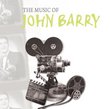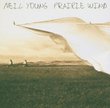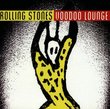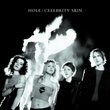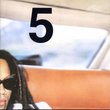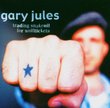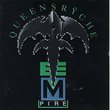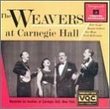| All Artists: Peggy Seeger Title: Peggy Seeger: The Folkways Years, 1955-1992 - Songs Of Love And Politics Members Wishing: 3 Total Copies: 0 Label: Smithsonian Folkways Original Release Date: 5/21/1992 Re-Release Date: 9/14/1993 Genres: Country, Folk, Pop Styles: Classic Country, Traditional Folk, Contemporary Folk, Singer-Songwriters Number of Discs: 1 SwapaCD Credits: 1 UPCs: 093074004821, 093074004845 |
Search - Peggy Seeger :: Peggy Seeger: The Folkways Years, 1955-1992 - Songs Of Love And Politics
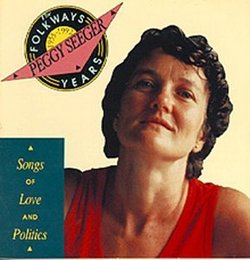 | Peggy Seeger Peggy Seeger: The Folkways Years, 1955-1992 - Songs Of Love And Politics Genres: Country, Folk, Pop
Peggy personally selected these traditional and original songs focused primarily on the themes of love and politics. From a dominant figure in the folk song movement in the U.S. and England for more than 35 years, these ti... more » |
Larger Image |
CD DetailsSynopsis
Album Description Peggy personally selected these traditional and original songs focused primarily on the themes of love and politics. From a dominant figure in the folk song movement in the U.S. and England for more than 35 years, these titles have reached millions: Freight Train, First Time Ever I Saw Your Face, Gonna Be An Engineer. "21 tracks display the variety of Peggy's repertoire, her range of styles, love of tradition and innovative songwriting prowess." -- Homespun Tapes Similar CDsSimilarly Requested CDs
|
CD Reviews21 tracks spanning Peggy Seeger's contribution to folk music Mr. B. E. Power | Brighton, UK | 08/28/2001 (5 out of 5 stars) "This is a very generous anthology of songs in the folk idiom so listeners are bound to have particular favourites. The first ten tracks (apart from track 2) are traditional songs played on a variety of instruments - banjo, tinwhistle, guitar, autoharp, mandolin, and dulcimer. What mainly binds these songs together is the quality of performance. The songs illustrate a range of vocal effects and instrumental techniques. "Broomfield Hill" (Child 43) tells the story of a rather flirtatious lady who outwits a young man, who would have taken advantage, had he been permitted to. "Jellon Graeme" (Child 90) is a gory ballad, which acts as a warning to men who kill their pregnant lovers rather than doing the honourable thing. A common interest in ballads was one of the factors that brought Peggy Seeger and Ewan MacColl together. Two Child ballads are well performed to banjo accompaniment. Peggy's banjo playing was another factor that attracted Ewan's attention (apart from seeing Peggy Seeger's face!). Needless to say, these songs are traditional, as is the humorous "The Squire and the Colic". The jubilant chorus line and the Squire's productivity, bring back memories of audiences at The Singer's Club (Britain's first Folk Club, of which MacColl, Seeger and the Critics Group were residents) enjoying folk music's equivalent to a rugby song. Of the traditional songs, my favourites are: "Going To The West", "Freight Train", "When I Was Single" and "Pretty Saro" - which show the length of my listening span. I like to compare Peggy Seeger's version of "Pretty Saro" with that of "Judy Collins". The two versions illustrate the many variants of lyrics and musical accompaniment in folk music. The contemporary songs on the album are written by Peggy Seeger except for tracks 12, 18 and 19. Track 12 "The First Time Ever I Saw Your Face" was written by Ewan MacColl for Peggy Seeger. They partnered one another for over 30 years. Ewan wrote Track 19 "Nobody knew she was there?" for his mother, Betsy Miller whose life was a catalogue of domestic duties, bar her enormous repertoire of songs. I am used to hearing Ewan sing of Betsy's hard life. Here the song is hauntingly sung and accompanied on the Appalachian dulcimer by Peggy. Peggy's contemporary lyrics illustrate both her social concerns and her role as a counterpart to Ewan in the best folk duo of the twentieth century. Many of Ewan's earlier song compositions celebrated 'the working man as hero' while Peggy's earlier songs relate to her own voyage through life "Song of Myself", her family - "My Son" and "Song for Calum" and women's issues "Little Girl Child" (written later for her daughter Kitty) and "Gonna Be an Engineer". "Song of Choice" could almost have been written by either Peggy or Ewan. Together they were fierce critics of the unacceptable faces of capitalism and Ewan's anti nuclear campaigning is founded in his work with Joan Littlewood - his first wife with whom he co-founded Theatre Workshop. "Thoughts of Time" has all the benchmarks of Peggy's realism - the circles and seasons quality which pervades many Seeger family songs. Americans obviously notice the weather and the time of year! There is a refreshing innocence in many of the songs that Peggy chooses to sing, though she can compose in several modes. "Thoughts of Time" reflects on the twenty year age difference between MacColl and Seeger and the inevitability that they will go their different ways. The lyrics are simple and honest. Compare "Thoughts of Time" with track 2 "Lady, What Do You Do All Day" or "Enough is Enough" and you will see that Peggy Seeger is capable of composing and delivering very complex lyrics, which she can sing and play at the speed of an express train. When the content is biting social or political satire, these songs can be as challenging to audiences as some of the longer ballads and are vastly entertaining, providing you understand any contemporary reference to British or American politics. These days I have to brush up on my campaigners for women's rights! Track 18 "Talking Wheelchair Blues" (written by Fred Small) is reminiscent in its wit and social message of Peggy's own wheelchair song (based on field work) "Woman on Wheels". Irene Scott, who since Ewan's death in October 1989 has performed on a growing number of albums with Peggy, contributed to the words of "Garden of Flowers", written for Ewan in June 1989. Peggy left England to set up home in America in the 1990s, marking the end of the Folkways Years and a new beginning, which has broadened the base of her music - moving away from 'strictly folk' to songs which feature her versatility as a pianist and vocalist, supported by the fine voice of Irene Scott and the vocal backings and instrumental skills of a family of accomplished musicians, who include her sons and daughter - Neill, Calum and Kitty MacColl."
|

 Track Listings (21) - Disc #1
Track Listings (21) - Disc #1
